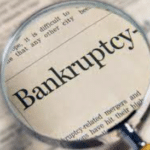California Homestead Exemption New Assembly Bill 1885 expands California’s homestead exemption enhancing the benefits of filing a chapter 7 and chapter 13 bankruptcy. This new legislation went into effect January 1, 2021. The idea behind the new bankruptcy California homestead exemption law is to help limit liabilities while protecting homeowners from losing their homes in
bankruptcy law
What Happened to Silicon Valley Bank?
Silicon Valley Bank On Friday, March 10, 2023, Silicon Valley Bank collapsed. Silicon Valley Bank (SVB) was the 16th largest bank in the United States, and its collapse was the second largest bank collapse in United States history. How Did SVB End Up Here?Over the span of just a couple of days, thousands of SVB’s
The Value of the Right Bankruptcy Attorney
Finding the Right Bankruptcy Attorney Bankruptcy can be a scary word. However, with the right bankruptcy attorney, it may spell relief. Filing for bankruptcy may provide a solution to debt problems and give you a fresh start. All bankruptcy proceedings are governed by the Bankruptcy Code, which classifies bankruptcy matters in different chapters depending on
Will I lose My Retirement Account to Creditors in Bankruptcy?
Will I Lose My Retirement Account to Creditors in Bankruptcy? For those considering bankruptcy as a debt relief strategy, a main concern is whether they will lose their retirement account to creditors as part of the process. The short answer is, “it depends.” In many situations, keeping retirement savings is possible, but this is not
Does Bankruptcy Clear Tax Debt in California
Does Bankruptcy Clear Tax Debt Individuals and businesses facing financial peril want to know, does bankruptcy clear tax debt in California? Those considering bankruptcy are typically dealing with severe financial stress which resulted from distinct types of debt and financial burdens. Will filing for bankruptcy put you back on the right financial track? Is Bankruptcy
Bankruptcy and Student Loans
Are Student Loans Dischargeable in Bankruptcy? For many years conventional wisdom has been that student loans are not eligible for discharge in bankruptcy filings. However, as we learn more about bankruptcy and student loans, we have found recent court rulings which may be opening the door for some borrowers to wipe out their student loan
Chapter 7 Bankruptcy
Chapter 7 bankruptcy involves the liquidation of a debtor’s assets in order to pay a portion of their debts. Any remaining debts are then fully discharged, leaving the debtor free and clear of any liabilities. If a debtor has limited means in order to continue paying their creditors, this may be the best option for
Discharging state income taxes in bankruptcy
State Income Taxes in Bankruptcy State income tax can be burdensome and may contribute to a debtor’s decision to file for bankruptcy. Fortunately, state income tax is dischargeable in bankruptcy under certain circumstances. Those circumstances are largely identical to the circumstances under which federal income taxes can be discharged, as the power of the bankruptcy
Requirements for Discharging Taxes in Bankruptcy
A debtor will typically file for bankruptcy in order to seek the protection of the bankruptcy laws against debts that cannot be paid in full, and it is not uncommon that such debts will include federal tax debts owed to the Internal Revenue Service (IRS). Typically, federal tax debt is not dischargeable in bankruptcy. That









